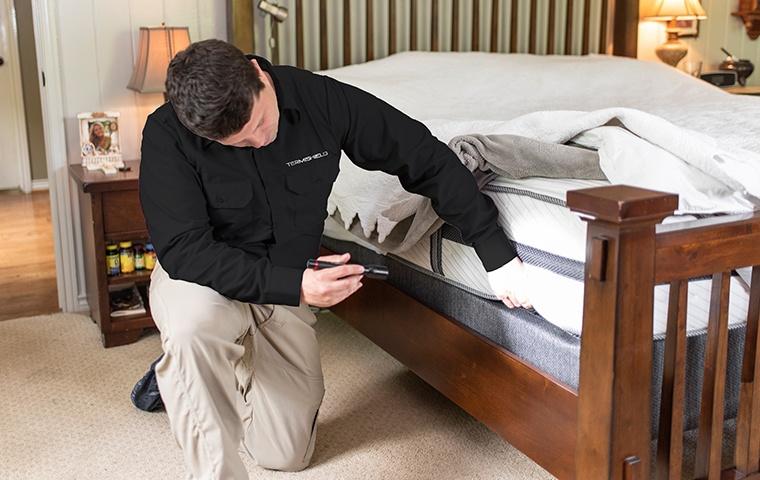Ingenious Bug Control Solutions for Long-Term Monitoring of Parasite Infestations
In the realm of pest control solutions, the evolution in the direction of cutting-edge strategies for the lasting monitoring of insect infestations has been a focal factor for industry specialists seeking sustainable options. From the assimilation of sophisticated innovations to the implementation of environmentally friendly strategies, the landscape of parasite management is continuously adapting to meet the difficulties presented by consistent bug concerns.

Advanced Technologies in Bug Control
Advanced innovations have the possible to transform the method pest control solutions operate, supplying more reliable and sustainable options to pest problems. These systems utilize sensing units and electronic cameras to supply real-time information on pest activity, making it possible for insect control experts to pinpoint infestation hotspots properly.
An additional groundbreaking modern technology is the advancement of precision application tools, such as drones and automated dispensers. These devices permit specific and effective distribution of chemicals, making sure optimum performance while reducing direct exposure to non-target organisms. Additionally, developments in genetic research have actually led to the creation of genetically changed microorganisms that target certain bugs, providing a more eco-friendly choice to typical parasite control approaches. By welcoming these cutting-edge technologies, insect control services can improve their efficacy, reduce prices, and advertise sustainability in bug administration practices.

Eco-Friendly Pest Administration Solutions
Eco-conscious pest management options focus on eco-friendly practices to resolve insect infestations efficiently while decreasing harm to ecological communities. These services focus on avoiding bug issues through positive actions such as habitat alteration, exemption techniques, and natural repellents. For circumstances, securing fractures and gaps in structures can assist prevent bug entry, minimizing the requirement for chemical therapies. In addition, making use of scent traps, ultrasonic devices, and beneficial pests can aid in regulating bug populaces without hurting the environment.
Integrated Pest Management (IPM) is a crucial method in environmentally friendly parasite control, incorporating biological, cultural, physical, and chemical tools to manage bugs successfully. By highlighting surveillance, avoidance, and control strategies, IPM lessens the usage of chemicals and advertises long-term insect prevention.
Moreover, green pest management services additionally take into consideration the effect on useful microorganisms, pollinators, and other wildlife in the community (Bed Bug Exterminator Las Vegas Services). By using sustainable methods and green products, pest control services can effectively manage invasions while advertising ecological stewardship and biodiversity conservation
Integrated Insect Administration Approaches
In the world of insect control services, a pivotal method that emphasizes detailed and lasting pest management practices is Integrated Pest Management (IPM) IPM is a strategic technique that combines different strategies to minimize the adverse impacts of insects while prioritizing environmental and human safety. This method incorporates organic, cultural, physical, and chemical tools to address insect invasions properly.
One of the fundamental concepts of IPM is the focus on avoidance as the main methods of bug control. By determining and rectifying variables that add to more tips here pest problems, such as entry points or food sources, IPM aims to proactively manage parasite activity prior to it intensifies. In addition, IPM advocates for monitoring bug populaces to examine the effectiveness this page of control procedures and make informed decisions for lasting pest administration.
Additionally, IPM advertises the targeted application of pesticides only when essential and in a way that decreases risks to non-target organisms. By making use of a combination of techniques customized to particular bug species and environmental problems, Integrated Insect Monitoring techniques offer an alternative and sustainable strategy to pest control.
Remote Surveillance and Control Equipment

One significant advantage of remote surveillance and control systems is their capability to find insect problems at a beginning. Early detection enables quicker intervention, preventing bugs from establishing big swarms and causing considerable damages. These systems allow bug control drivers to target certain locations with accuracy, lowering the requirement for broad-spectrum pesticides and reducing ecological influence.
Moreover, remote monitoring and control systems use remote accessibility, allowing bug control professionals to check and handle pest activity from anywhere at any kind of time. This function improves functional efficiency, saves time, and makes it possible for speedy reactions to emerging parasite problems. Overall, the assimilation of remote tracking and control systems in pest monitoring practices stands for a considerable improvement towards extra efficient and sustainable bug control services.
Sustainable Bug Prevention Methods
With a raising focus on green methods and effective parasite management, the execution of sustainable bug avoidance methods has actually come to be a prime focus in the advancement of modern parasite control services. Lasting parasite prevention More hints approaches focus on long-lasting remedies that minimize environmental effect while effectively handling pest populaces. These approaches encompass a variety of approaches aimed at stopping parasites from entering or flourishing in a certain location without relying heavily on chemical treatments.
One trick sustainable insect avoidance approach is integrated pest administration (IPM), which incorporates biological, cultural, physical, and chemical tools to resolve parasite issues in an alternative fashion. By promoting all-natural pest predators, utilizing mechanical obstacles, and executing environment modifications, IPM lowers reliance on chemicals and fosters a healthier ecosystem balance.
Additionally, correct cleanliness methods, normal upkeep checks, and architectural repairs play vital roles in preventing pest infestations. By dealing with favorable conditions that attract pests, such as food sources, water leaks, and entry points, proactive measures can significantly decrease the danger of invasions without triggering harm to the atmosphere. Embracing lasting insect avoidance approaches not just safeguards human wellness and residential or commercial property but likewise adds to an extra sustainable and eco-conscious strategy to pest control.
Final Thought
Finally, the assimilation of advanced technologies, environmentally friendly remedies, and sustainable avoidance techniques in parasite control solutions provides lasting administration of pest problems. By carrying out incorporated bug administration methods and remote surveillance systems, companies and homeowners can properly control and prevent pest troubles without relying upon hazardous chemicals. Bed Bug Exterminator Las Vegas Services. This ingenious strategy ensures a healthier setting while properly managing pest populations for the long-term